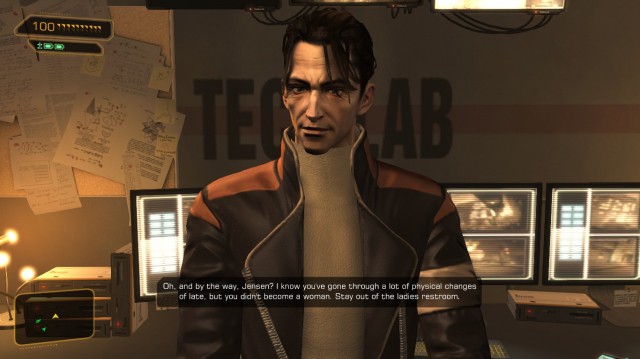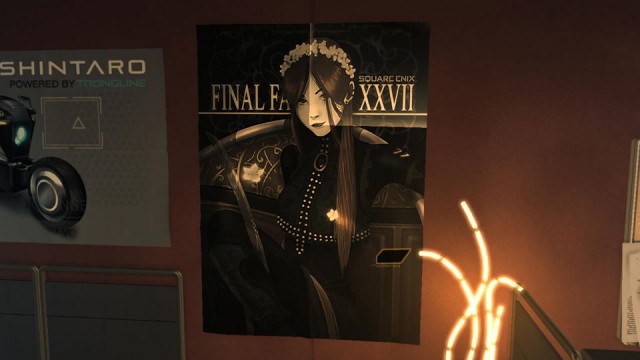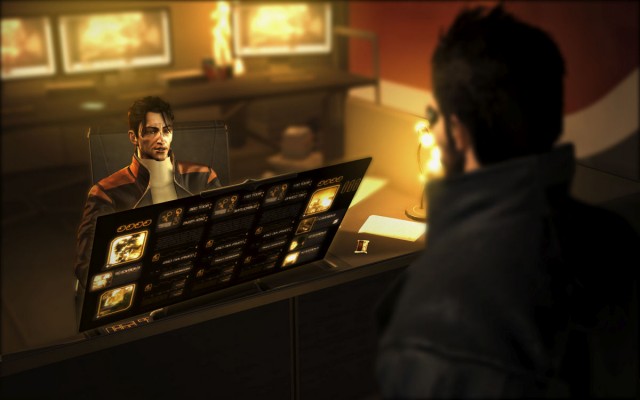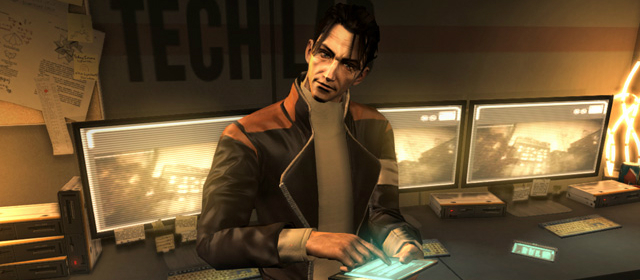Name: Francis Wendell “Frank” Pritchard
Game: Deus Ex: Human Revolution (2011)
Species: Human
In his own words: “Stick to kicking down doors and shooting people Jensen, and stop trying to do my job. I guarantee you’ll get along better that way.”
Warning: This article contains spoilers for Deus Ex: Human Revolution. Not game-ruiners perhaps, but certainly… twist dampeners.
As long as games have sought to tell stories, they have used characters like Frank Pritchard to help them do so. Companions who converse with you either in person, over a radio or, like Pritchard, over the infolink permanently implanted into your skull, are a perfect solution to the problem of incorporating dialogue and plot into single-person gaming without interrupting play with a cutscene. Before sound cards could handle voice acting, these characters spoke through text boxes, but regardless of the way their words are delivered, they’ve been a narrative staple for decades: a reassuring (or profoundly irritating) presence to guide you through the hostile game world.
Pritchard doesn’t do anything particularly original with his role, but unlike many such characters, he’s interesting and funny, even though the jokes are often at his expense. He’s also, if you’re a fan of the redemptive character arc, about as lovable as a bitter misanthrope with a direct link into your head could possibly be, and as such has inspired an unprecedented volume of fan art, fanfic, and NSFW tributes of all varieties. Though this may at first seem surprising for a peripheral character, a closer look at Pritchard’s role in the game and his relationship to the protagonist makes his popularity more understandable.
As the head of the cyber-security division at human augmentation firm Sarif Industries, Pritchard has spent the last few years of his professional life at loggerheads with the brooding and manly Adam Jensen, Sarif’s Chief of Security and protagonist of the game. As Jensen, the player must form an alliance with the bitter and sarcastic Pritchard and battle to uncover the truth behind the terrorist attacks on their company.
Pritchard’s demeanour is well-suited to the game’s tale of corporate warfare: he’s as weaselly as he is paranoid. Weaselly in that he’ll deliberately obstruct one of Jensen’s more petty investigations just so he can be the one to reveal the culprit to CEO David Sarif, paranoid in his unending belief that Sarif’s computer systems and everything they guard are under attack. To be fair, he’s usually right about this. A plot twist early on in the game reveals that a serious hacking attempt on the company was enabled by a loophole deliberately put in place by someone higher up the company than Pritchard.
While his “guilty until proven innocent” mentality serves him and Sarif Industries well in a professional sense, it doesn’t make him very popular with his colleagues, whom he openly disparages and insults. The first time we meet Pritchard, he’s in a lift, and he responds to Jensen’s query as to whether he plugged a hole in the company firewall with contempt, sneering, “Yes, I did. Want to know how? Oh wait. Ex-cop. I doubt you’d understand.”

Pritchard berates you for exploring the ladies’ loo. But there were candy bars in there!
This is but one example of Pritchard’s perpetual attempts to undermine or belittle Jensen early in the game, perhaps because he envies the latter’s physical strength, fearlessness and the relationships he has with his colleagues, most notably the enigmatic and beautiful scientist Megan Reed, and David Sarif himself. His intellectual arrogance is certainly unappealing, but like all attempts to overcompensate for a perceived weakness in the self, it betrays a vulnerability which it’s hard not to find a little endearing, especially if you’re a nerd, or know a lot of nerds, something that’s pretty likely if you’re playing Deus Ex: Human Revolution.
Nerds in video games are almost always well-written because people who make video games are nerds. “These are our people,” games seem to say, “and even though we might not always like them, you can’t say we don’t understand them.” And much as we’d all like to believe we’re gravelly-voiced man-cyborg Adam Jensen, there will be a fair few Deus Ex: Human Revolution players who see more than a little of themselves in the snarky and frustrated, but undeniably brilliant Pritchard.
Hack into computer terminals in secret bases and rival company offices and you’ll find text exchanges between conspirators bemoaning the skill of Sarif’s own “Nucl3arsnake”, who makes it impossible for them to crack the company’s systems. Hack into Pritchard’s own computer, and you’ll find a rejection letter from a television company tersely explaining that “it is very difficult for us to imagine how a 13-episode dramatic series built around the ‘Nightly coding exploits’ of ‘Nucl3arsnake: Hacker extraordinaire’ would appeal to our target demographic.”
You don’t need to know that “Nucl3arsnake” is Pritchard’s self-imposed screen name to guess that his TV pilot is more than a little autobiographical. This makes it especially heartbreaking to read the rest of the e-mail, which concludes: “to be honest, the main character seems somewhat underhanded and obsequious.” Poor Pritchard, so misunderstood!
Though he largely avoids becoming a stereotype by virtue of nuanced writing and a decent character arc, this tiny in-game detail, so easy to miss, endows him with the kind of insecurities that we could all believe a gifted IT professional might have. Undeniably gifted, but at something unglamorous, someone like Pritchard will never be happy if they tie their self-worth into what others (especially those at Picus TV) think about him. It’s no surprise that he sees Jensen, who doesn’t care what anybody thinks of him, as his own personal antagonist.
However, as events progress, Prichard softens towards Jensen, showing genuine concern for his well-being later on in the story when the stakes are high. It’s a subtle shift, taking place almost imperceptibly as the two co-operate to get to the bottom of a dark and complex plot and begin to realise that the only person each can depend on is the other. The change in their relationship doesn’t become clear until a crucial plot twist at a late stage in the game, when you realise that aside from spunky pilot Faridah Malik, Pritchard is the only character who’s never lied to Jensen.
Perhaps it’s Pritchard’s touching expressions of concern as Jensen puts himself in greater and greater danger as the story progresses, or perhaps it’s the fact that their bickering betrays genuine chemistry, but for some reason, the relationship between them, though of marginal importance to both Deus Ex: Human Revolution’s plot and the series’ wider philosophical questions, is apparently not of marginal importance to the game’s legions of fans. This is made clear by the enormous volume of fan-made Pritchard/Jensen art and slashfic that abounds on the internet, expanding on the canonical events in the game with incredibly detailed (and at times anatomically correct) stories that take the relationship to another level altogether.

The Final Fantasy XXVII poster in Prichard’s office at Sarif Industries, the mark of a true nerd.
Now, if you’re unfamiliar with the idiosyncratic world of slashfic, allow me to elaborate. It’s a specific kind of fan-fiction (i.e. fiction written by fans of a fictional universe that takes place within that universe, preferably in a way that doesn’t outright contradict that universe’s canon, or officially recognised series of events) that focuses on romantic relationships between characters (preferably male) who don’t exhibit such a relationship in any official games/books/films/TV shows. If you’ve never heard of it before, it may seem strange, but it’s incredibly popular, and an important part of the fertile soil of fan culture. Here’s an example:
The cyborg leaned his face a little closer to the smaller man’s. “And how do you feel about me, Francis?” At Pritchard’s stubborn silence, he slowly closed the gap between them, allowing for the tech to deny him if he wanted. Frank stared defiantly at the ground, arms crossed, until he felt warm lips on his own. His eyes widened at the contact, in disbelief that this was actually happening. He grabbed Adam’s head when the ex-cop began to pull back, and returned the kiss with rough passion. Now that Jensen had gone and opened the floodgates, he sure as hell wasn’t going to hold back.
– From “I Don’t Play Around“, by LoveandScience
Goodness! There’s an awful lot more where that came from, most of it rather less safe for work. It’s not just fiction either; fan art is also rich with depictions of Sarif Industries’ finest in various states of undress. A quick search of DeviantArt (perhaps the spiritual home of fan art) for “pritchard deus ex” yields a wealth of suggestive and beautifully-realised renderings of our heroes. I suggest you take a look for yourself, but my favourites are “Signal Lost“, which sweetly epitomises Pritchard and Jensen’s in-game relationship, and “Pritchard’s Yoghurt Night“, one in “a series of drawings which involve men character [sic] with bare chest, pink spoon and a dab of yoghurt for no reason”.
Man, I love the internet.
Anyway, the phenomenon of fan fiction in relation to Deus Ex: Human Revolution was brought to the fore back in March, when senior development staff at Eidos Montreal decided to make it the focus of one of their highly entertaining “EMP Minisodes”, the appropriately-named “Fanfic“. In the minisode (the fun starts around the 25:50 mark), game director Jean-Francois Dugas, lead narrative designer Mary DeMarle, and game designer Antoine Thisdale read snippets of various pieces of fanfic, eventually reading aloud an early section of LynnaB’s (definitely not safe for work) “Keep an Eye on Me”:
Pritchard looked down to the slack hand resting on top of the covers and, without further thought, ran his fingertip over the smooth surface of one finger digit. The metal was strangely warm to the touch. He pushed gentle against the back of the artificial hand. It was firm and ultra-smooth and very likely armor-plate. […] His exploring fingers moved up along the forearm, oddly fascinated with the mixture of rigid steel and softer synthetic muscles before he took Adam’s hand in his own, studying the stark contrast of glossy-black metal against his rosy skin. His breath hitched when the artificial fingers twitched and moved a little before they closed slowly around his own, holding his hand in ways that almost grazed the line of a lover’s gentle touch.
– From “Keep an Eye on Me“, by Lynna B
Although they can barely contain their mirth, the development team are unanimous in their appreciation of “Keep an Eye on Me”, and the other gems they read from in the minisode. They not only liken fanfic to their own endeavours to write a prequel to the revered Deus Ex, but also express delight that fans connect with their characters in such an unexpected way. “When we build characters, we really want them to be compelling in many ways”, Dugas explains. “The fact that people think about those characters in that way, it means that what we created makes them believe that that could happen. I find it fascinating. And hilarious”.
The team are right to celebrate this most niche of fan tributes. Deus Ex: Human Revolution is a game that tackles enormous and complex political and philosophical themes: transhumanism, the relationship between science, religion and the state, and the freedom of the media. It would have been so easy for Eidos Montreal to simply use their characters as mouthpieces for the game’s various viewpoints, as so many science-fiction characters in all mediums are reduced to, and yet they’re all given richness and depth. Pritchard could have been a one-note exposition dispenser, but he’s better that, and the continuing and, well, vivid affection for him across the game’s fan base is testament to that.

Jensen seeks Pritchard’s wise counsel.
You can sneer at fan-fiction all you want, but there’s no denying it’s a heartfelt reaction to characters that are so well-written that people want to imagine that they have a life of their own outside the original stories. That Pritchard crops up in so much of it simply shows the effect that he’s had, impressive for an NPC with an attitude problem. Credit must go to Eidos Montreal not just for creating such an excellent character, but for sowing the seeds of characterisation around the world in such a way that you can’t help but imagine the life he leads when he’s not guiding Jensen through Tai Yong Medical’s security systems.
The best bits of Deus Ex: Human Revoluion’s story, that is to say, the most human bits, can only be discovered if you truly take the time to explore. Hack Pritchard’s computer, snoop around his office, read his e-mails to his work colleagues, get to know the man behind the sarcasm, the part of himself he thinks he’s hidden. If he ends up in airbrushed clinches with Jensen on DeviantArt, it’s because his character is drawn similarly; his apartment littered with the scattered photos and cartoon-mascotted cereal boxes of a lonely bachelor.
It’s these details that make Deus Ex: Human Revolution’s science-fiction story affecting, rather than just plain thought-provoking. Of course, thought-provoking would have been enough, but the game would have felt like a thesis, rather than a story. The game is about the evolution of an entire species, for better or worse, and a glimpse into the inner lives of Pritchard and the rest give us context, a reason to care what happens to them in the end. After all, you can’t have a human revolution without humans.





